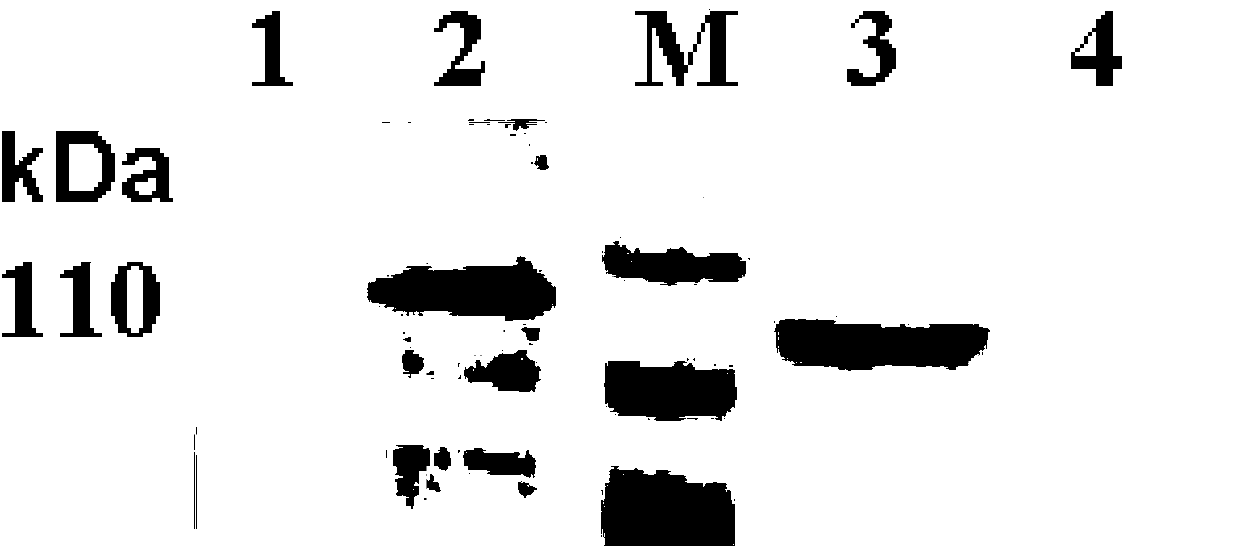Monoclonal antibody BTV16-3G10 resistant to bluetongue virus serum 16 type VP2 protein, B-cell epitope polypeptide identified by monoclonal antibody BTV16-3G10, and applications of monoclonal antibody BTV16-3G10
A bluetongue virus, monoclonal antibody technology, applied in the direction of antiviral immunoglobulins, viral peptides, antiviral agents, etc., can solve the problems of no vaccine, poor protection, and inability to play a protective role
- Summary
- Abstract
- Description
- Claims
- Application Information
AI Technical Summary
Problems solved by technology
Method used
Image
Examples
Embodiment 1B
[0036] Example 1 Eukaryotic expression and purification of BTV-16VP2 protein
[0037] 1. Primer design
[0038] Eukaryotic expression adopts Bac-to-Bac baculovirus expression system, and PCR amplification primers are designed according to the L2 gene sequence (JN671907) of BTV16 registered in GenBank, BTV16L2-22F: 5'-ACGAATTCATGGAGGAGCTAGTTATACC-3'(EcoR I); BTV16L2-2901R: 5′-CCGTCGACTTAAATATTTAGAAGCTTCGTG-3′ (Sal I).
[0039] 2. Construction of eukaryotic expression vector of BTV-16VP2 protein and eukaryotic expression and purification of VP2 protein
[0040] First, use primers BTV16L2-22F and BTV16L2-2901R to amplify the BTV-16 VP2 gene (the size of the amplified fragment is 2896bp), and perform gel recovery. Then utilize restriction endonuclease EcoR I and Sal I to reclaim the VP2 gene that obtains and the shuttle vector pFastBac of baculovirus TM HTA was subjected to double enzyme digestion respectively. Digested VP2 gene and pFastBac using T4 DNA fast ligase TM HTA wa...
Embodiment 2
[0054] The preparation of embodiment 2 monoclonal antibody
[0055] 1. Mice Immunization
[0056] Four 6-week-old female BALB / c mice were immunized with the BTV16 VP2 recombinant protein expressed and purified by the Bac-to-Bac baculovirus expression system, and immunized three times with two weeks between each immunization. The protein was mixed and emulsified with an equal volume of Freund's complete adjuvant, and the recombinant VP2 protein was mixed and emulsified with an equal volume of Freund's incomplete adjuvant for the second and third immunizations.
[0057] One week after the second and third immunizations, blood was collected from the tail of the mice, the serum was separated (4°C, 10,000 rpm, 20 min), and the antibody level was detected by indirect ELISA. Three days before cell fusion, booster immunization was performed on BALB / c mice with good immune effect, and each mouse was intraperitoneally injected with 50 μg of immune antigen (without adjuvant).
[0058] ...
Embodiment 3
[0064] Identification of embodiment 3 monoclonal antibody
[0065] 1. Subclass identification of monoclonal antibodies
[0066] Subclass identification of the monoclonal antibody obtained in Example 1 was carried out according to the operating instructions of the SBA ClonotypingTM System / HRP Antibody Subclass Identification Kit.
[0067] The results show that the heavy chain of the monoclonal antibody BTV16-3G10 of the present invention is IgG 1 , the light chain is a κ chain.
[0068] 2. Western blot test
[0069]The insect cell lysate inoculated with wild-type baculovirus was used to express and purify the BTV16VP2 recombinant protein through the Bac-to-Bac baculovirus expression system, and the cell pellet and BHK-21 cell pellet after the BTV16 virus supernatant was harvested by centrifugation Afterwards, SDS-PAGE electrophoresis was carried out, and then the protein was transferred to the nitrocellulose membrane by electrotransfer, and the electrotransfer condition was ...
PUM
| Property | Measurement | Unit |
|---|---|---|
| Molecular mass | aaaaa | aaaaa |
Abstract
Description
Claims
Application Information
 Login to View More
Login to View More - R&D
- Intellectual Property
- Life Sciences
- Materials
- Tech Scout
- Unparalleled Data Quality
- Higher Quality Content
- 60% Fewer Hallucinations
Browse by: Latest US Patents, China's latest patents, Technical Efficacy Thesaurus, Application Domain, Technology Topic, Popular Technical Reports.
© 2025 PatSnap. All rights reserved.Legal|Privacy policy|Modern Slavery Act Transparency Statement|Sitemap|About US| Contact US: help@patsnap.com



